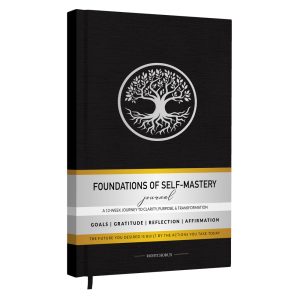In today’s fast-paced world, it’s easy to lose sight of the good. That’s why using gratitude journal prompts can be a deeply transformative practice.
Rooted in mindfulness and backed by psychology, these prompts help train your brain to focus on what’s working rather than what’s missing.
Reflective writing doesn’t just reduce stress—it opens the door to lasting emotional well-being, clarity, and resilience.
In this article, you’ll learn how to apply gratitude prompts with intention, build a consistent journaling habit, and integrate growth-oriented tools like the Foundations of Self-Discovery Mastery Journal into your daily life.
Whether you’re new to journaling or rekindling a beloved practice, you’ll discover techniques and inspiration that meet you exactly where you are.
Foundations of Self Discovery & Mastery Journal: A 13-Week Personal Development Journal System
$29.95
The Foundations of Self Discovery…
Table of Contents
How to Get Started with Gratitude Journal Prompts
Starting your day or winding down your night with gratitude prompts can be a powerful way to restore emotional balance and enhance mental clarity.
Research shows that expressing gratitude activates the brain’s reward system, reducing cortisol and increasing dopamine—your natural feel-good chemicals.
By consistently applying these prompts within your journaling practice, you’re actively training your mind to notice the positives, even in challenging circumstances.
Gratitude journaling isn’t about ignoring the hard parts of life. It’s about pairing awareness with appreciation.
With a few intentional steps, journaling can shift from being a sporadic habit to a cornerstone of your emotional wellness routine.
Why Gratitude Matters for Mental Clarity and Joy
One of the most compelling benefits of gratitude journaling is how it rewires your brain for optimism and emotional resilience.
When you engage in reflective writing using gratitude prompts, you actively shift your attention away from worry, fear, or scarcity and towards joy, abundance, and hope.
Studies in positive psychology highlight that habitual gratitude journaling can:
- Lower symptoms of depression and anxiety
- Improve sleep and physical health
- Enhance cognitive functioning and decision-making
- Strengthen relationships and empathy towards others
Practicing gratitude trains your prefrontal cortex—an area of the brain tied to planning and reasoning—to favor positive interpretations.
This daily calibration fosters self-compassion, anchors your attention in the present, and cultivates more joy and inner peace.
Setting the Stage for Intentional Journaling
To build consistency, it’s essential to create a journaling ritual that feels nourishing and sustainable.
Whether it’s five minutes in the morning or ten at night, the key is consistency, not perfection.
Enhance your journaling space with:
- A quiet corner free of distractions
- Calming background music or nature sounds
- A favorite beverage like herbal tea or lemon water
- A high-quality journal that invites you to write
The Foundations of Self-Discovery Mastery Journal is especially effective here.
With its daily guidance and curated gratitude prompts, it effortlessly integrates into mindful routines, helping you bring structure, clarity, and emotional regulation into your busy day.
Foundations of Self Discovery & Mastery Journal: A 13-Week Personal Development Journal System
$29.95
The Foundations of Self Discovery…
Unlock Self-Awareness Through Gratitude Prompts

When you write with gratitude at the center, you gain more than just optimism—you gain deeper self-knowledge.
Prompts let you explore both the light and shadows of your life, ultimately offering a mirror to your internal world.
This dual awareness builds authenticity and fuels transformation.
Unlike stream-of-consciousness journaling, gratitude journal prompts guide your reflections.
They help you reveal truths you might otherwise avoid or overlook.
When done consistently, they offer insights that elevate your understanding of who you are and who you aspire to become.
Journaling as a Doorway to Deeper Self-Knowledge
Gratitude journaling isn’t merely list-making. It becomes a profound act of self-discovery when questions prompt exploration.
By combining structured reflection with emotional honesty, you untangle your values, identify recurring thought patterns, and rediscover what truly fuels your joy.
Reflective gratitude prompts like these deepen self-awareness:
- “What challenge am I grateful for today, and why?”
- “What inner strength did I rely on today?”
- “How did I make someone’s day a little better?”
- “What surprise blessing caught me off guard?”
When you let your journal be a judgment-free space rather than a polished performance, this practice becomes more than mindful—it becomes transformational.
How the Foundations of Self-Discovery Mastery Journal Strengthens This Practice
A free-form notebook is valuable, but having a structured guide keeps you engaged and aligned.
The Foundations of Self-Discovery Mastery Journal isn’t just any journal. It’s a 13-week self-mastery system that includes:
- Curated gratitude and reflection prompts
- Daily quote-question-affirmation framework
- Morning and evening routines for structured insight
- Sections for value-alignment, review, and revision
This journal supports deep emotional inquiry while gently guiding your pen and thoughts.
Whether you’re navigating a life transition or craving consistent mental clarity, this journal acts as a low-pressure mentor for your personal-growth journey.
Foundations of Self Discovery & Mastery Journal: A 13-Week Personal Development Journal System
$29.95
The Foundations of Self Discovery…
Using Gratitude Prompts to Improve Emotional Resilience
Gratitude journal prompts do more than create feel-good moments—they help you build emotional strength.
By learning to shift your attention to the small wins and reframe emotional setbacks, research shows we enhance our resiliency, even in the face of stress or uncertainty.
Use gratitude prompts to snap out of reactive spirals and reorient toward empowerment. This emotional flexibility becomes your inner anchor during difficult times.
Embracing Small Wins and Joy-Filled Moments
Writing about the little things that go right cultivates an attitude of mindfulness. These micro-moments of joy add up, creating a buffer against negativity and stress.
In the rush of everyday life, it can be easy to overlook them—but gratitude prompts help catch them in the act.
Try these daily inspiration prompts:
- “What was one peaceful moment I experienced today?”
- “What made me smile in the last 24 hours?”
- “What beauty did I notice in an unexpected place?”
- “What skill or quality helped me today—even a tiny bit?”
This kind of writing gently shifts your narrative from lack to abundance, reinforcing your capacity to stay grounded even when life feels chaotic.
Reframing Challenges Through Journal Reflections
It’s not just the good times we can be grateful for—challenges carry their own hidden gifts. Reflecting on the lessons within obstacles empowers you to find meaning in discomfort.
Use gratitude prompts to reframe hardship:
- “What did today’s difficulty teach me about myself?”
- “What past hardship prepared me for today’s challenge?”
- “Who helped support me through adversity recently?”
- “What’s one silver lining I discovered through struggle?”
By practicing these reframes consistently, you develop what psychologists call “cognitive flexibility”—the ability to shift perspectives with intention instead of spinning in emotional reactivity.
Foundations of Self Discovery & Mastery Journal: A 13-Week Personal Development Journal System
$29.95
The Foundations of Self Discovery…
Creative Gratitude Journal Prompts to Try Today

Even a strong journaling habit can feel uninspired from time to time. That’s completely normal.
Continuing with gratitude journal prompts, even on low-motivation days, sustains forward momentum while honoring your emotional state.
The key? Keeping prompts diverse, seasonal, and emotionally attuned.
You don’t need a new idea every time—often, returning to old prompts with a new lens is enough to spark depth and clarity.
Unique Gratitude Prompts for Different Moods and Seasons
Our emotional landscapes shift with the day, week, or season. Tailoring your prompts to your current mood helps keep your reflection relevant and impactful.
Try mood-based prompts such as:
- “Today I feel _______, and I’m grateful for how this emotion is guiding me.”
- “When I’m exhausted, I’m still thankful for…”
- “In this season of change, what feels steady and true?”
- “What brings me comfort when the world feels uncertain?”
Whether it’s the sun of summer or the stillness of winter, seasonal reflection offers a refreshing rhythm to your journaling practice.
Consistency is Key: Make Gratitude a Daily Habit
Reflective consistency—especially with gratitude prompts—is foundational to long-term mindset shifts.
One of the greatest allies in this consistency is an intuitively designed journaling tool—like the Foundations of Self-Discovery Mastery Journal.
It eases the mental load of deciding what to write each day by providing:
- Daily gratitude and reflection structure
- Proven frameworks like “What Went Well” and “Tomorrow’s Next Step”
- A 13-week journey to foster genuine habit formation
- Self-check-in and review pages to track emotional growth
Daily journaling becomes less of a chore and more of a grounding practice when supported by something so thoughtfully built.
Foundations of Self Discovery & Mastery Journal: A 13-Week Personal Development Journal System
$29.95
The Foundations of Self Discovery…
Making Gratitude Prompts Work for a Busy Lifestyle
Even if you’re constantly on the move, you can harness the power of gratitude journal prompts in short, meaningful doses.
In fact, micro-journaling—quick bursts of written reflection—is rising in popularity precisely because it works within busy modern routines without sacrificing impact.
With a little creativity, journaling can become a flexible and nourishing habit wrapped around your daily rhythms.
Quick Journal Prompts for Morning or Evening Reflection
Whether you’re commuting, sipping morning coffee, or winding down before sleep, you can take just five minutes to return to gratitude.
Try stashing your journal in a visible place and setting a recurring reminder on your phone to nudge the habit.
Keep a prompt list handy for time-crunched moments:
- “One thing I’m looking forward to today is…”
- “Today I felt proud of myself for…”
- “A person I’m extra grateful for today is…”
- “Before I sleep, I want to thank this day for…”
Tiny prompts like these support mindfulness on even the busiest days.
Mobile Journaling vs. Paper Journaling
Digital journaling apps and notes tabs can be useful for spontaneous moments—but many find paper journaling provides greater mindfulness and focus due to fewer distractions.
The tactile process of pen on paper also ignites different areas of the brain involved in creativity, motor skills, and memory formation.
The Foundations of Self-Discovery Mastery Journal offers the experience of writing with structure, textures, and emotional resonance that apps often can’t replicate.
By physically holding the space for your growth, you reinforce the commitment to show up daily—for yourself.
Foundations of Self Discovery & Mastery Journal: A 13-Week Personal Development Journal System
$29.95
The Foundations of Self Discovery…
Aligning Values Through Gratitude Prompts and Self-Discovery

Gratitude isn’t about surface-level positivity—it’s an intentional way to stay attuned to what matters to you.
When paired with value-driven reflection, gratitude journal prompts become a compass pointing toward your most aligned relationships, decisions, and goals.
Journaling becomes a values-clarifying tool that not only highlights what you’re thankful for—but why.
Journaling to Understand What Truly Matters to You
When you understand what you value—freedom, love, honesty, creativity—your actions begin to align with those priorities.
Using gratitude prompts to explore these values makes your journaling deeper and more personally relevant.
Prompts for this exploration include:
- “What core value did I honor today?”
- “How can I express gratitude in alignment with my beliefs?”
- “Which moments today felt most fulfilling and why?”
- “How does my gratitude reflect what’s most important to me?”
Your answers reveal your internal landscape and bring harmony between your thoughts, words, and actions.
How a Value-Based Journal Enhances Emotional Intelligence
Self-aware gratitude journaling not only uplifts your mood but sharpens your emotional intelligence. You begin to:
- Tune into emotional triggers and positive patterns
- Respond to stress with curiosity instead of reactivity
- Recognize when your intentions align with behavior
- Express appreciation with thoughtfulness and authenticity
The Foundations of Self-Discovery Mastery Journal integrates values-based frameworks alongside gratitude exercises, promoting emotional literacy and awareness in your everyday life.
Foundations of Self Discovery & Mastery Journal: A 13-Week Personal Development Journal System
$29.95
The Foundations of Self Discovery…
Building a Personalized Gratitude Prompt Toolkit
Creating a personalized set of your favorite gratitude journal prompts is a wonderful way to ensure consistency and connection in your journaling practice.
As your life evolves, your prompts can too—growing with your emotional needs and reflective style.
By crafting your go-to prompt kit, you keep journaling engaging while staying grounded in what matters most to you.
How to Curate Your Own Set of Favorite Prompts
Not every gratitude prompt will resonate every day. Save or create the ones that do.
Consider keeping a running list on a sticky note, bookmark, or the first page of your journal.
A solid toolkit might include:
- Daily grounding questions for morning clarity
- Reflective prompts for emotional processing
- Values-based gratitude cues
- Prompts you’ve found especially healing in hard times
Use your personal toolkit as inspiration whenever you face journaling fatigue or resistance.
Rotate Prompts for Emotional Depth and Variety
Rather than starting from scratch each day, rotating your gratitude prompts helps you tap into different emotional layers.
Use a system—weekly rotations, random draws, seasonal themes—to keep your practice fresh and alive.
Try building a rotation like:
- Monday: Small wins
- Tuesday: Relationships
- Wednesday: Inner growth
- Thursday: Nature
- Friday: Self-love
This creates an intentional, evolving connection with your journal and keeps the process emotionally enriching.
Conclusion
Using gratitude journal prompts daily isn’t just about creating lists—it’s a habit that transforms your mindset over time.
From building emotional resilience to deepening self-awareness, this practice reconnects you with what’s working, what matters, and who you’re becoming.
No matter how busy or overwhelmed you feel, taking even five minutes a day to journal using tools like the Foundations of Self-Discovery Mastery Journal can initiate real psychological and emotional shifts.
Start small. Start where you are. Let your journal be a gentle companion on the journey toward clarity, balance, and self-mastery.
One prompt, one page, one thank-you at a time—you’re building your future from the inside out.
Frequently Asked Questions
Start simple. Try prompts like “What made me smile today?” or “Who do I feel thankful for right now and why?” These ease you into the practice of reflection without feeling overwhelming.
Consistent use of gratitude prompts helps improve emotional resilience, reduce anxiety, and foster a more optimistic mindset by shifting your focus to the positive aspects of life.
While personal preference plays a role, many find that morning prompts help set a positive tone for the day, while evening journaling allows for thoughtful reflection and calm before sleep.
Absolutely. Those moments are the most valuable times to try. Prompts can help you reconnect with hope, gain perspective, and recognize small things that still hold meaning amid challenges.
The Foundations of Self-Discovery Mastery Journal is a great choice. It’s thoughtfully designed with gratitude prompts and values-based exercises that guide you through deep self-understanding and positive habit formation.
Pair your journaling with an existing routine—like right after brushing your teeth or morning coffee. Using a structured journal like the Foundations of Self-Discovery Mastery Journal also provides built-in prompts that make habit formation easier.
Yes! Gratitude prompts can be simplified for younger age groups. Journaling helps teens build emotional intelligence and mindfulness early in life.
That’s normal, especially in the beginning. Over time, your awareness will deepen. Try using varied prompts or guided tools like the Foundations of Self-Discovery Mastery Journal to keep your reflection dynamic and engaging.
Yes. Some examples include “What’s one kind thing someone did for me today?” or “How have my friends or loved ones supported me this week?”
Definitely. Reflecting on even the smallest positives during hardship can shift your mindset and help build emotional resilience. It’s also a tool for self-soothing and gaining clarity during uncertainty.







